The UK2 Government has taken drastic actions to deal with Covid-19, but are these actions and fears in proportion to the reality?
Levels of mortality in 2019/2020 are very similar to those suffered in 1999/2000.
Quarantines and draconian interventions were not justified then and as millions of jobs are lost from the economy due to the lockdown, we must ask whether they are now?
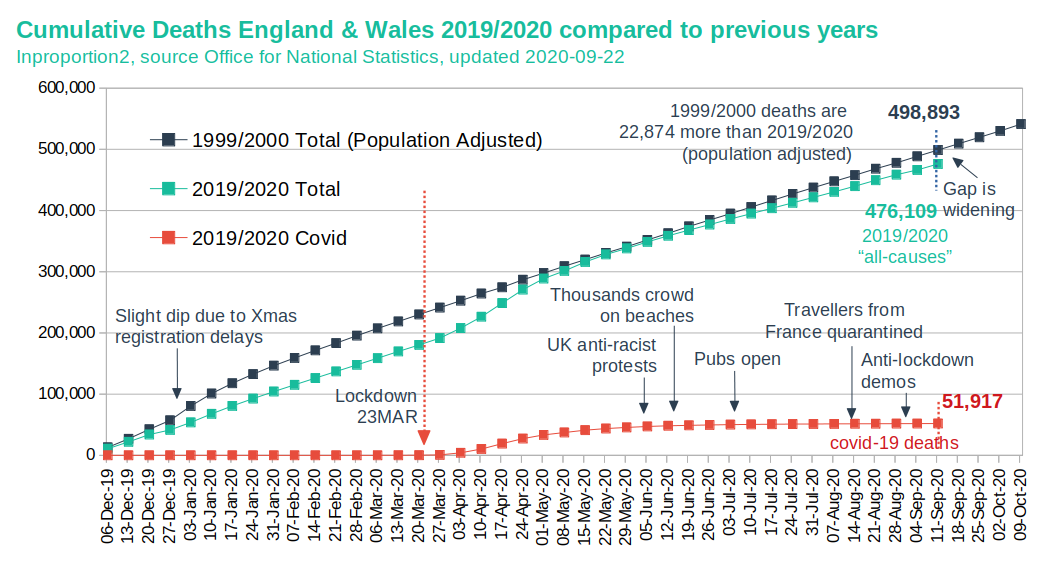
In the following chart we can see that, in terms of overall mortality, 2019/2020 has been very ordinary for the under 45s: there has been no excess mortality at all for this age group[1]
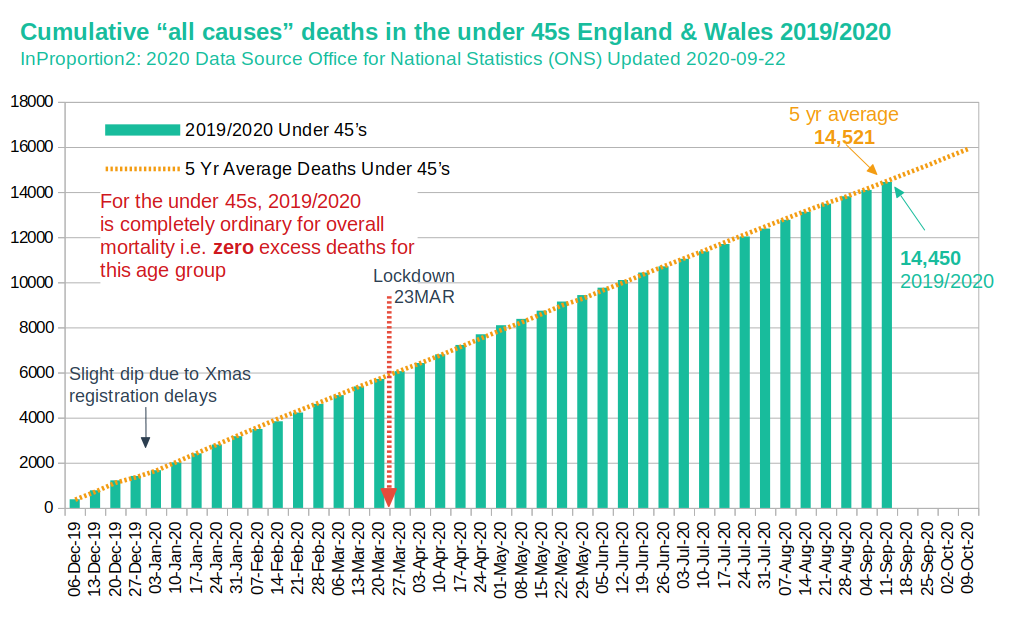
If we compare Covid with 2017/2018, a recent season with high levels of flu/respiratory mortality we can note that:
-
Overall we are about four weeks worse than the mortality count for 2017/2018
-
Lockdown has had a minimal if any impact on in flu/respiratory deaths. If you look carefully you can see a slight dip in numbers to reflect delays to death registrations at Christmas. You might think that the lockdown would also have had a noticeable impact on the flu/respiratory data but it does not.
-
A closer look at the data will reveal that Covid infection rates were already declining before the lockdown which suggests that lockdown did not slow Covid infections either.
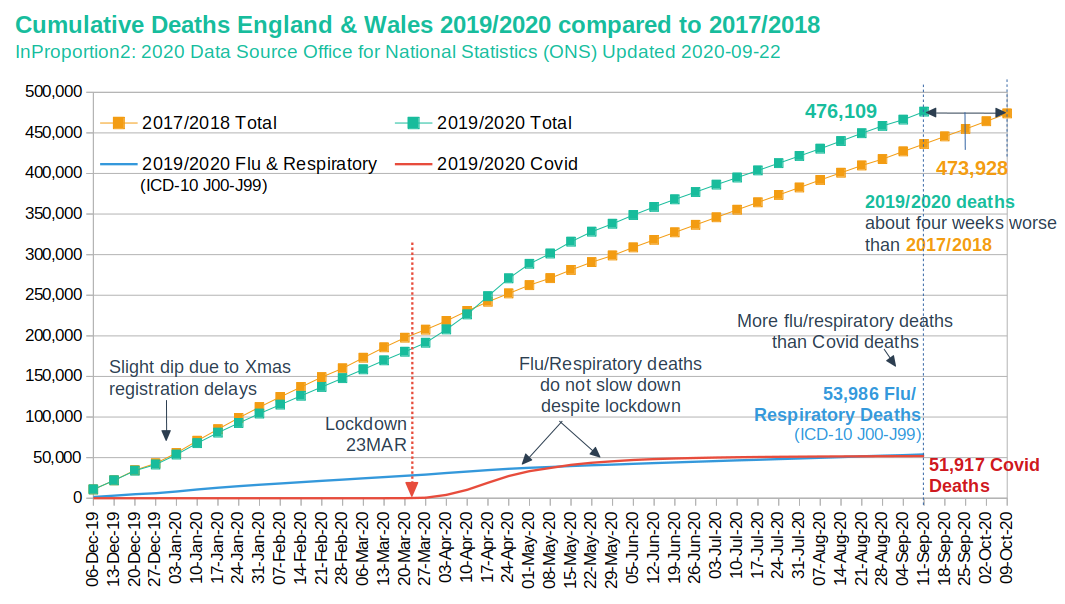
Weekly death totals reveal large number of "collateral" deaths
The following chart shows the proportion of weekly deaths that are due to Covid-19 in the context of total deaths in the same time period during 1999/2000 - another bad flu/respiratory season. The April 2020 peak is actually lower than the January 2000 peak (totals adjusted to reflect 14% growth in population).
In the long term, there will be a huge price to pay for the lockdown in terms of damage to the economy and in knock-on effects to health and mortality. Everyone expects this. However, it may be that the impact of the lockdown has already had a measurable negative impact on mortality!
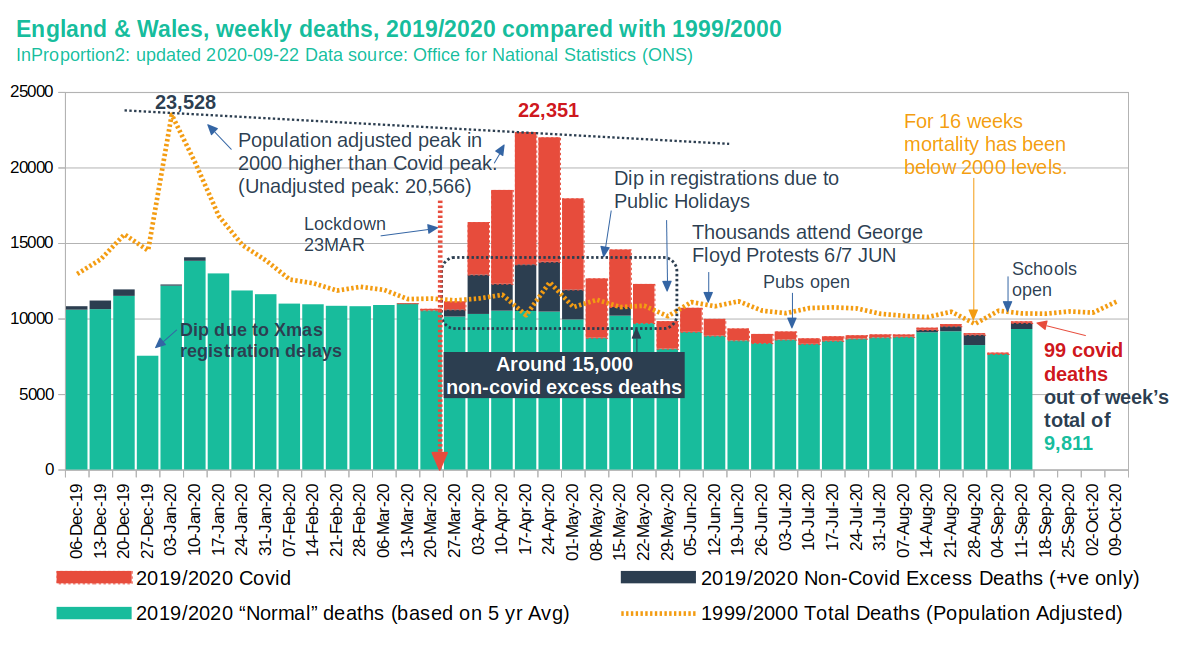
By the tail end of the outbreak, compared to the 5 year average, an excess of 15,000 deaths occurred not attributed to Covid (dark blue in the above chart).
Are some of these non-covid excess deaths a result of a reduction in the delivery of normal hospital services due to the lockdown?
Have thousands already paid for the lockdown with their lives? (See discussion of this here)
On 29 April, the UN's International Labour Organisation stated that, due to the lockdowns, nearly half the global workforce is at risk of losing livelihoods. [1].
Those who decide that the lockdown is the right thing to do, need to be very sure that its immense price is worth paying.
The lockdown may not be helping
If you compare Sweden and Japan with the UK, it looks as if the lockdown may not have helped
It is taken by many for granted that the lockdown would save lives by slowing the spread of the virus. This may not be true. In the UK strict lockdown measures were imposed on 2020-03-23. Neither Sweden nor Japan imposed strict lockdowns and both have done well compared to the UK.
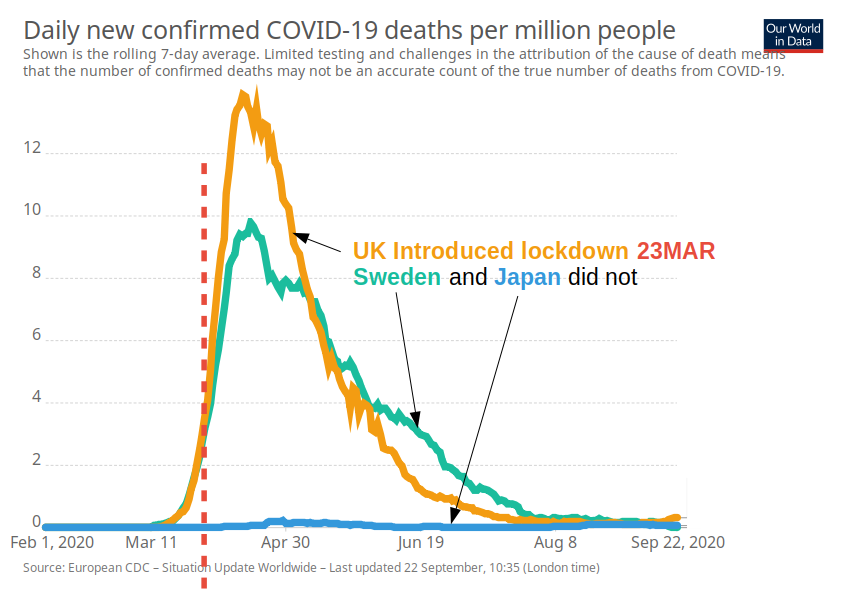
In other countries too, stringent lockdowns tend to be linked to higher infection rates
Sweden may be doing better than the UK because it is less densely populated. It is therefore useful to compare with more countries.
The Oxford University Coronavirus Government Response Tracker compares around 150 countries giving them a stringency score that reflects how strict a country's lockdown measures are. Oxford has plotted the stringency index against the number of Covid-19 cases for that country.
For example, Taiwan (TWN) (at time of writing only 7 Covid-19 deaths) is associated with one of the least stringent lockdowns [2].
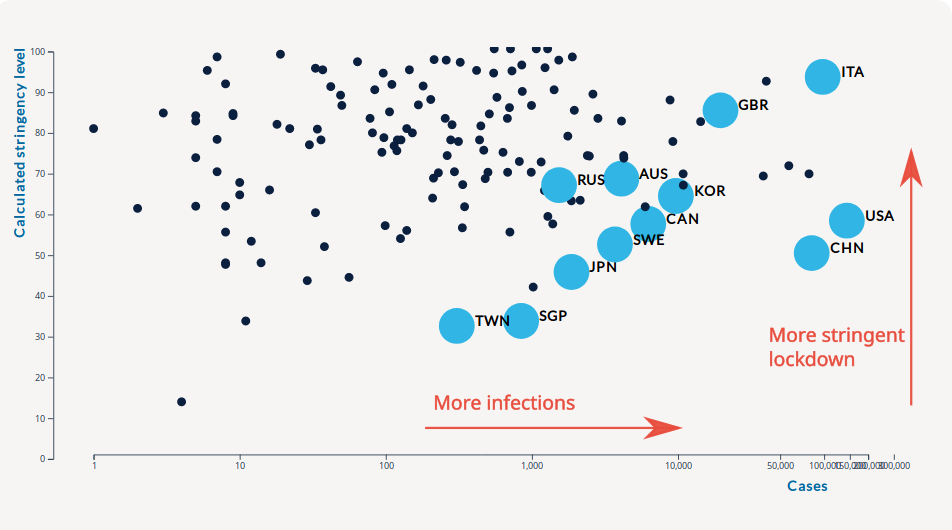
Response tracker shows data to 30MAR, lockdowns were approximately at their strictest
Some will rightly point out that correlation does not mean causation, however it becomes difficult to support causation in the presence of a negative correlation.
Japan has had more than 25,000 Covid-19 cases - if strict lockdown is necessary to stop the virus from spreading and killing large numbers of people, why has it not been necessary in Japan?
The following table compares some key data items for Japan and the UK. Why has Japan suffered far fewer deaths from Covid?
UK |
Japan |
|
Population (millions) |
68 |
126 |
Megacities |
1 |
3 |
Median age |
40 |
47 |
Lockdown stringency (BSG Oxford): |
82 (strict) |
48 (mild) |
Covid Deaths to 22SEP (Worldometer) |
41,825 |
1,500 |
What does the data show?
JP Morgan have analysed the data in a number of different ways and reported on 7 July 2020:
"reopening dates, mobility changes and other empirically measured behaviors do not lead to higher infections in any statistically consistent way"[2]
In other words, there is no evidence in the copious amounts of data now available that there is any connection between the lockdown and the progress of the virus.
Many experts advise that strict lockdown is not the best policy
One of the UK government's chief advisers who provided key input into the decision to lockdown, Physicist Professor Ferguson, has resigned in disgrace after failing to respect the lockdown he recommended as so essential for others. (Daily Telegraph, Neil Ferguson's Imperial model could be the most devastating software mistake of all time). Meanwhile numerous epidemiologists and medics continue to question the wisdom of strict lockdowns:

Professor Paul Moynagh, Immunologist, National University of Ireland, speaking on RTE Radio One 2020-05-02:
"When I look at the effects of lockdown – I’m surprised and disappointed in terms of the relatively small effect that lockdown has had ... So in terms of the effectiveness of lockdown, and it being justified to close down the entire economy – I think there has to be a discussion."
[6]

Johan Giesecke Professor at the Karolinska Institute Medical University in Stockholm, former Swedish State Epidemiologist and author of a standard epidemiology text book, writing in the Lancet on 2020-05-05:
"It has become clear that a hard lockdown does not protect old and frail people living in care homes — a population the lockdown was designed to protect.
Neither does it decrease mortality from COVID-19, which is evident when comparing the UK's experience with that of other European countries."
[5]

Dr Gérard Krause head of Department for Epidemiology at the Helmholtz Centre for Infection in Braunschweig
"We have to keep these serious social measures as short and as low as possible, because they could potentially cause more illnesses and deaths than the coronavirus itself."
[1]

Professor Dr. Frank Ulrich Montgomery is former President of the German Medical Association and Deputy Chairman of the World Medical Association.
"I’m not a fan of lockdown. Anyone who imposes something like this must also say when and how to pick it up again. ...
Italy has imposed a lockdown and has the opposite effect. They quickly reached their capacity limits, but did not slow down the virus spread within the lockdown."
[3]

Dr Jay Bhattacharya
Dr Eran Bendavid and Dr Jay Bhattacharya are professors of medicine and public health at Stanford University:
"A universal quarantine may not be worth the costs it imposes on the economy, community and individual mental and physical health"
[2]

Dr Richard Schabas is the former Chief Medical Officer of Ontario, Medical Officer of Hastings and Prince Edward Public Health and Chief of Staff at York Central Hospital.
"I am not preaching complacency. This disease is not going away any time soon; we should expect more cases and more local outbreaks...
but we also need to be sensible. Quarantine belongs back in the Middle Ages. Save your masks for robbing banks. Stay calm and carry on. Let’s not make our attempted cures worse than the disease."
[2]

The German Network for Evidence-Based Medicine is an association of about 1000 German scientists, researchers and medical professionals founded to promote evidence-based and patient-oriented medicine
"A Cochrane Review from 2011 found no robust evidence for the effectiveness of border control screenings or social distancing.
...A systematic review from 2015 found moderate evidence that school closures delay the spread of an influenza epidemic, but at high cost.
Isolation at home slows down the spread of influenza but leads to increased infection of family members"
[2]

Dr Anders Tegnell is a Swedish physician and State Epidemiologist of the Public Health Agency of Sweden since 2013.
"Older people or people with previous health problems should be isolated as much as possible. ... That is the one rule. The other is:
Anyone with symptoms should stay at home immediately, even with the slightest cough.
If you follow these two rules, you don’t need any further measures, the effect of which is only very marginal anyway"
[2]

Dr Sucharit Bhakdi is a specialist in microbiology and infection epidemiology. He is emeritus professor at the Johannes Gutenberg University in Mainz.
(The German government’s anti-COVID19 measures) ...
"are grotesque, absurd and very dangerous...The life expectancy of millions is being shortened. The horrifying impact on the world economy threatens the existence of countless people."
[3]

Dr Joe Brownlie CBE BVSc PhD DSc LLD(Hons)
Dr Joe Brownlie is an emeritus professor of veterinary pathology, Department of Pathology and Infectious Diseases at the Royal Veterinary College, London.
Dick Sibley is the director and principal of West Ridge Veterinary Practice in Devon.
[4]"Veterinary surgeons with any experience in dealing with infectious disease and population medicine will be looking at the government’s current management of the Covid-19 epidemic with dismay
It is a strategy not so much to save lives but to delay deaths."
Sources for expert quotations:
Is the cure worse than the disease?

To deal with the threat of COVID-19 the UK Government has ordered unprecedented shut-downs and quarantines, and many support this in the spirit of "better safe than sorry". However, this overlooks the fact that shutdowns and quarantines also kill. The economic, social and health costs will almost certainly include:
- Earlier deaths for cancer sufferers due to diagnosis and treatment delays
- Business failures leading to more business failures
- Job losses leading to poor health, social problems and suicides
- Fewer taxpayers available to fund an increasing need for social benefits
- Reduced funding for the NHS and the rest of the public sector
- Lost educational opportunities and disruption to exams and graduations
- Inflation as Government "prints" and "borrows" more, while tax revenues fall
- Pension values reduced by stock-market crashes
- Reduced life expectancy for people moving deeper into poverty
Or in the words of a former UK Supreme Court Judge:
"The real question is, is this serious enough to warrant putting most of our population into house imprisonment, wrecking our economy for an indefinite period, destroying businesses that honest and hard-working people have taken years to build up, saddling future generations with debt, depression, stress, heart attacks, suicides and unbelievable distress inflicted on millions of people who are not especially vulnerable, and will suffer only mild symptoms or none at all?"
See Costs for more on the human and economic costs of the quarantines and shutdowns.
“All I maintain is that on this earth there are pestilences and there are victims, and it's up to us, so far as possible, not to join forces with the pestilences.”
Video Overview
Ivor Cummins has produced an amazing analysis of covid numbers and patterns. If you want to improve your understanding of covid, how we got here and where we might go next, I would urge you to watch it.
#InProportion2 for comments and questions
Follow @InProportion2 for updates
Notes and sources:
-
[1] A similar observation has been made by Sir David Spiegelhalter:
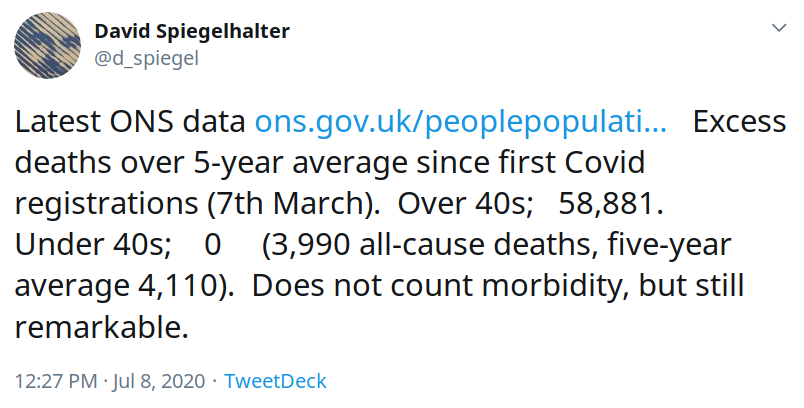
-
[2] Eye on the Market, J.P. Morgan, Michael Cembales, 7 July 2020